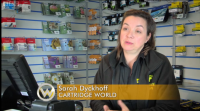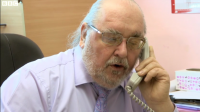 BBC’s Watchdog show interviewed industry representatives about the rising costs of inkjet cartridges.
BBC’s Watchdog show interviewed industry representatives about the rising costs of inkjet cartridges.
The programme, regularly shown on the BBC 1 channel, champions consumer rights and helps expose bad business, and in its episode screened on 1 May, the show featured a piece on the rising prices of inkjet cartridges in comparison to their shrinking size.
The issue, which has previously been covered by British newspapers including the Guardian and the Daily Mail, was taken up by Watchdog through guest presenter Rick Wakeman, former keyboardist for progressive rock band Yes.
Wakeman converses with Cartridge World Aylesbury’s Sarah Dyckhoff and UKCRA and Promax’s Chris Brooks in the piece, which highlights HP’s rising inkjet prices and compares the price of ink to other expensive liquids.
The show presented the statement that ink is the “most expensive liquid”, with HP’s inkjet cartridges containing only five millilitres of ink at a cost of £12 ($18.67/€14.17), equating to a litre costing £2,400 ($3,735/€2,835).Another comparison made is that 4,000 litres of crude oil would cost this much, or 68 bottles of premium whisky.
Dyckhoff shows the camera the differing sizes of the sponges within the HP inkjet cartridges and their shrinking over the past few years, with the programme noting that whilst the HP inkjet cartridges are cheaper to buy, they hold “less than a third of the ink” of previous cartridges. Industry website HPinkcartridges.co.uk previously showcased the sponge issue last year.
Wakeman also discusses Canon and Epson’s shrinking cartridge sizes, noting that Canon’s cartridges have shrunk from 26 to 15 millilitres, whilst Epson’s have almost halved from 13 to seven militaries. Despite Epson halving the price of their inkjet cartridges, the ink would still work out at £1,140 ($1,774/€1,346) a litre.
The show moved on to hypothesise how much money it would cost for Wakeman to set up his own cartridge manufacturing business, with the presenter taking a call from Promax’s Brooks on how much each part of the cartridge would cost. The final cost of making a cartridge was worked out to be 29 pence (45 US cents/34 Euro cents).
The culmination of the section on cartridges focused on Epson and HP’s responses to the programme’s findings, with Epson stating that technological advances mean higher prices are necessary, and that it can only guarantee original cartridges will work. HP meanwhile stated that the increased prices help progress technology, and recommended consumers buy multipacks for cheaper costs.
The programme can be viewed here (UK users only), with the piece on cartridges beginning at the 43:50 mark.


